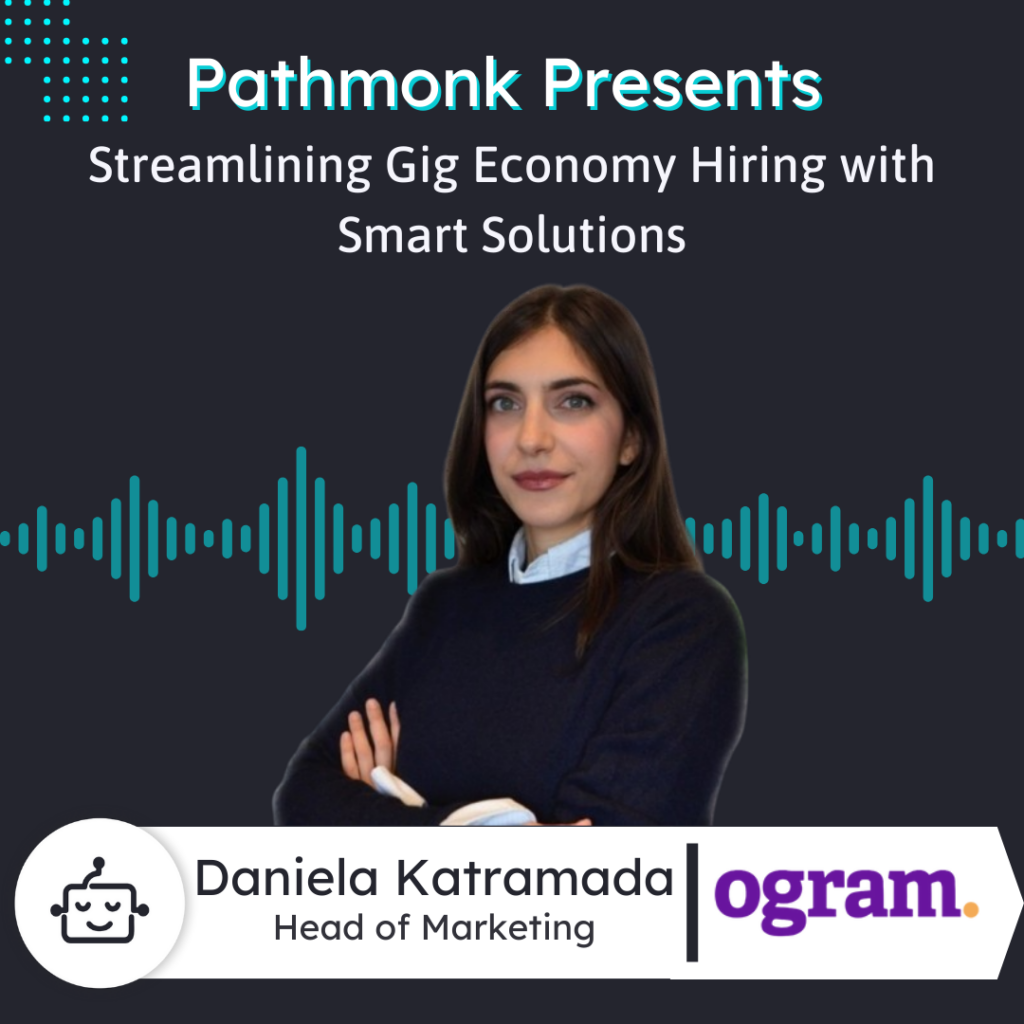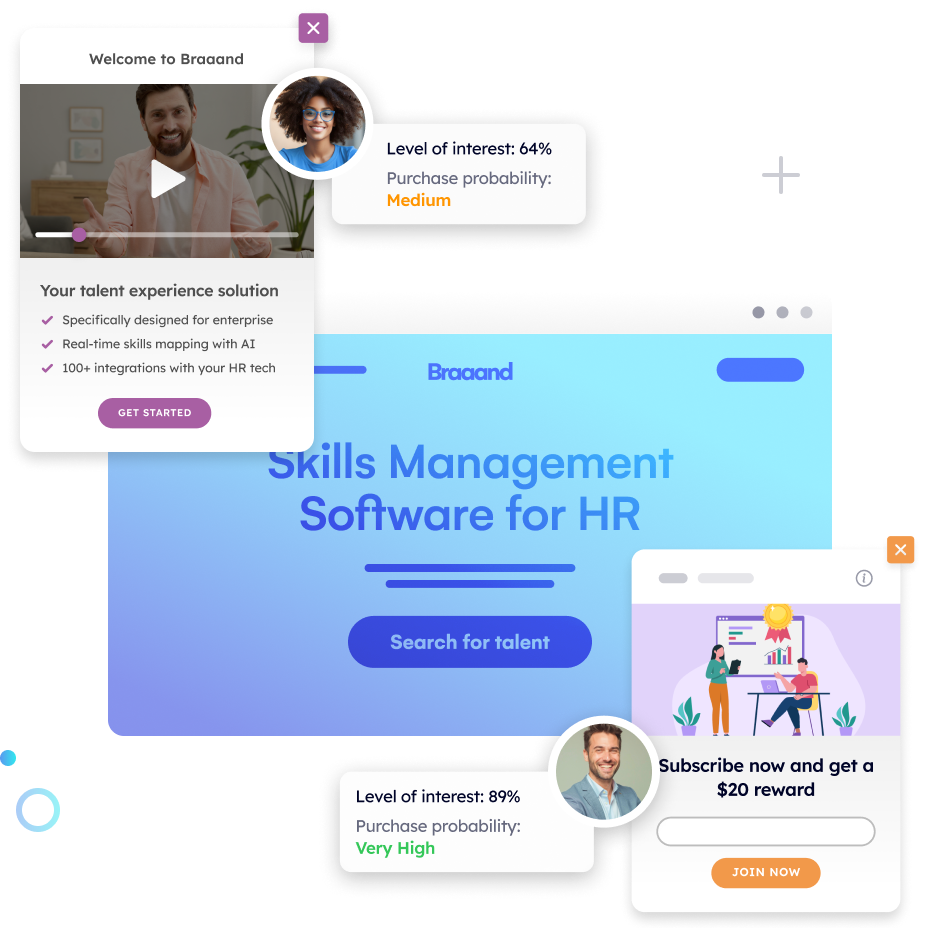
Introduction
Daniela Katramada, Head of Marketing at Ogram, joins Rick Veronese on Pathmonk Presents to discuss how this UAE-founded platform revolutionizes hiring for businesses and gig workers.
Connecting hospitality, logistics, and retail giants like Hilton and DHL with over 500,000 pre-qualified workers, Ogram simplifies recruitment via its app. Daniela shares their focus on Google and Facebook Ads, the app-driven conversion funnel, and untapped landing page potential.
Learn how Ogram supports the gig economy with scalable, hassle-free staffing solutions!
Increase +180% conversions from your website with AI
Get more conversions from your existing traffic by delivering personalized experiences in real time.
- Adapt your website to each visitor’s intent automatically
- Increase conversions without redesigns or dev work
- Turn anonymous traffic into revenue at scale

Rick: Pathmonk is the AI for website conversions. With increasing online competition, over 98% of website visitors don’t convert. The ability to successfully show your value proposition and support visitors in the buying journey separates you from the competition online. Pathmonk qualifies and converts leads on your website by figuring out where they are in the buying journey and influencing them in key decision moments with relevant micro experiences like case studies, videos, and much more.
Stay relevant to your visitors and increase conversions by 50% by adding Pathmonk to your website in seconds, letting the artificial intelligence do all the work while you keep doing marketing as usual. Check us out on path.com.
Everybody, welcome back to today’s episode of Pathmonk Presents. Today we are joined by Daniela Katramada. She’s the Head of Marketing at Ogram. Daniela, welcome to the show.
Daniela Katramada: Hello, thank you very much for having me here. I’m very happy to be here and to talk about marketing, landing pages—whatever has to do with that.
Rick: Amazing. Likewise, we’re excited to have you on. We like to get right into it. Daniela, can you tell us a bit about Ogram? What’s your company all about?
Daniela Katramada: Ogram is a platform that connects businesses with job seekers, primarily in the gig economy. Our goal is to make hiring more flexible, efficient, and scalable for companies. Whether a company needs temp staff, event workers, part-time support during peak seasons, or long-term freelancers, Ogram is there to help. We provide a seamless solution for hiring and recruiting through our platform and a large database of pre-qualified workers.
Rick: I was going to ask about the types of businesses you work with, but please, go ahead.
Daniela Katramada: The company started in 2017 in the UAE, where there was a strong demand for staffing platforms. We’ve since expanded into Saudi Arabia and Greece—both evolving markets, especially Saudi, which is booming. Ogram isn’t a job board—it streamlines the entire process from recruitment to payments, making it hassle-free for both employers and workers.
Rick: So in a way, you’re catering to both businesses and applicants.
Daniela Katramada: Exactly. It’s a B2B and B2C solution.
Rick: Right. That makes sense. So, in terms of your customers—on the business side—what’s the core problem you solve for them? What can they expect when they land on Ogram?
Daniela Katramada: We work in industries like hospitality, events, logistics, warehousing, and retail—industries that require a high volume of workers. For HR teams, it’s incredibly time-consuming to screen and interview all those people. That’s where Ogram steps in. We’ve partnered with major companies like Hilton, DHL, Marriott, and Noon. Once they sign up, they get immediate access to over 500,000 pre-qualified workers who’ve already been screened and interviewed by us.
Rick: That’s impressive. And there’s no contract involved?
Daniela Katramada: Exactly. We handle contracts, interviews, and payments. Clients can just focus on running and growing their business. Especially for large-scale needs, we take care of the heavy lifting.
Rick: I assume this is also helpful for events—when there’s a sudden spike in staffing needs?
Daniela Katramada: Exactly. And they don’t need to hire for longer than needed. It’s completely flexible. This also benefits job seekers—more opportunities, flexibility, and consistent pay.
Rick: And variety too, right? Different gigs, companies—some might even turn into long-term roles. I’m curious: who typically reaches out to you from the business side? Is it HR managers?
Daniela Katramada: Yes, mostly HR managers. Our audience finds us through social media, Google search, job boards, and LinkedIn. Interestingly, both our B2B and B2C audiences engage a lot with our content on LinkedIn. In terms of acquisition channels, Facebook and Google Ads are our top performers. They drive the highest volume and best quality of applicants.
Rick: Makes sense. And I assume you adapt based on where they are in the journey—awareness, consideration, conversion?
Daniela Katramada: Exactly. Facebook might be more for upper-funnel activity, while Google is more for intent-based actions. We try to align our content and messaging to the user journey.
Rick: And eventually they’ll land on your website. What’s its role in attracting new clients?
Daniela Katramada: The website doesn’t play a critical role in client acquisition—we focus more on the app for conversions. Most traffic is mobile-based, and onboarding happens in-app. That said, the website still matters. One area we want to improve is building more targeted landing pages for paid traffic. These could guide users more effectively and deliver the right information based on their stage in the funnel.
Rick: That’s a great insight. It’s about minimizing friction, especially in an attention-starved world. I call it the “Amazon Prime generation”—we want everything now.
Daniela Katramada: Exactly. Especially in our lead-gen campaigns, no one wants to fill out long forms or read endless copy. We have to keep things short, clear, and relevant. I always ask myself—would I click on this?
Rick: That’s a smart approach. On the topic of landing pages, have you learned anything from experience that helps make a website or landing page convert better?
Daniela Katramada: For me, it’s all about structure and clarity. The information should be clean and well-organized, with clear USPs. But beyond that, collaboration is key. Product teams and marketing need to work together, because marketing campaigns give you valuable data.
Tools like SEMrush or even basic Google Ads reports reveal which keywords people are actually using. If you use those keywords on your site, you boost SEO—and improve your performance in paid ads too. Google’s Dynamic Search Ads (DSAs) rely on your website content to show relevant ads, so better site content means better ad performance, lower CPCs, and more relevant reach.
It’s not just about a pretty website—it’s how everything connects: SEO, paid channels, copy, structure. A true omni-channel strategy.
Rick: Absolutely. It’s holistic. And I noticed you really lit up when talking about Google Ads—do you have a background in it?
Daniela Katramada: Yes! I started my career in Google Ads, and I’m passionate about it. I also love automating processes, and Google Ads allows for a lot of that. I enjoy how the platform operates and the results it delivers.
Rick: Very cool. Let’s shift to you as a leader. What’s a typical day like for you?
Daniela Katramada: Every day involves making sure we hit targets and fill job openings. There’s a lot of cross-functional communication and constant reprioritization. My team and I manage everything from Facebook and Google Ads to CRM and WhatsApp marketing—it’s quite dynamic.
Rick: Sounds busy—but not boring.
Daniela Katramada: Definitely not boring. The constant optimization keeps you on your toes. What works today might not work tomorrow, so you always need to be reviewing data, testing, and adjusting.
Rick: That’s a good segue into our rapid-fire round. Ready?
Daniela Katramada: Let’s go.
Rick: What’s the last book you read?
Daniela Katramada: The Dream of a Ridiculous Man by Dostoevsky. Not exactly cheerful—it’s a short story, but deeply philosophical and interesting.
Rick: A deep read! What’s one thing your company is most focused on right now?
Daniela Katramada: We’re refining our funnels—creating better awareness channels, improving how we move people through consideration, and converting those ready to act. We’re also focused on improving our product to help clients manage their workload more easily.
Rick: What’s one repetitive task you’d love to automate?
Daniela Katramada: Campaign creation. Ideally, I’d love a system that automatically pulls new entries from our admin, builds campaigns around them, and launches across channels—fully scalable, no human errors.
Rick: That would be a dream. Lastly, if people forget everything else from today’s interview, what’s the one thing they should remember about Ogram?
Daniela Katramada: That we help businesses hire on-demand and support the rapidly growing gig economy. We’re here for both B2B and B2C users, making the process flexible and efficient for everyone.
Rick: And if anyone wants to learn more?
Daniela Katramada: LinkedIn. Either search for Ogram or connect with me directly. And hopefully, you’ll see our ads across the board.
Rick: Perfect. Daniella, thanks again. Hope to see you on the show again—and have a beautiful day.
Daniela Katramada: You too. Thanks so much for having me.
Rick: Of course. Bye everyone.



